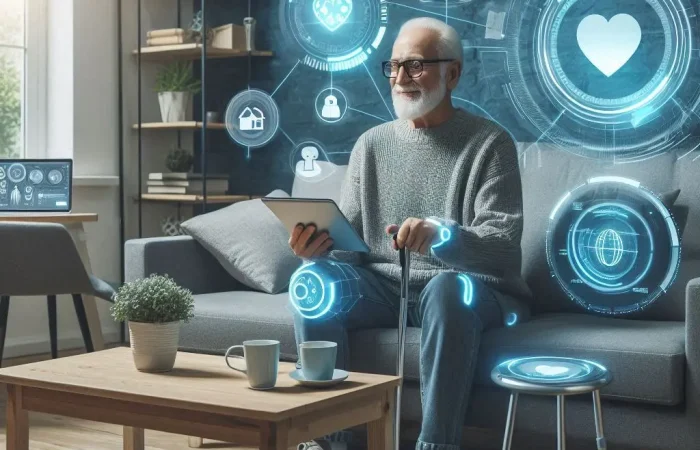INTRODUCTION:
Technology is becoming increasingly important in elderly care as the world progresses. The crossing point of care and innovation offers additional opportunities for upgrading the personal satisfaction, freedom, and wellbeing of more established grown-ups. From brilliant home gadgets that screen wellbeing and guarantee security to versatile applications that keep seniors associated with friends and family, innovation is reshaping the manner in which we approach maturing. Embracing these advancements tends to the useful requirements of seniors as well as enables them to live additional satisfying lives, overcoming any issues between conventional consideration techniques and the cutting edge computerized world. This investigation into old consideration and innovation uncovers how these devices can uphold and enhance the existences of more seasoned grown-ups, making maturing a more agreeable and noble experience.

- Enhancing Safety and Security
Description: Safety and security are paramount in elderly care, and technology offers a range of solutions to protect seniors in their homes.
- Smart Home Devices: Automated lighting, door sensors, and security cameras are examples of smart home technology that can aid inaccidents and ensure a secure environment for seniors.
- Fall Detection Systems: In the event of a fall, wearable devices equipped with fall detection technology can promptly notify caregivers or emergency services.
- Emergency Response Systems: Clinical ready frameworks permit seniors to call for assist with the press of a button, offering true serenity and fast reaction in crises.
- Supporting Health and Wellness
Description: Technology plays a crucial role in monitoring and managing the health of elderly individuals.
- Telehealth Services: Telehealth stages empower seniors to talk with medical care suppliers from the solace of their homes, diminishing the requirement for in-person visits and making medical services more open.
- Remote Monitoring: Gadgets, for example, circulatory strain screens, glucose meters, and pulse trackers can send information to medical services suppliers, considering nonstop checking and convenient mediations.
- Medication Management: Electronic pill allocators and update applications assist seniors with dealing with their prescriptions really, diminishing the gamble of missed portions or medicine mistakes.
- connecting with Loved Ones Through Communication Technology
- Video Calling and Social Media
Seniors can regularly see and talk to their loved ones through platforms like Skype, Zoom, and Facebook. Unlike traditional phone calls, video calls allow family members to see and interact with one another, creating a more intimate connection. This is especially comforting for those who live far apart.
- Virtual Communities and Support Groups
Online people group and care groups offer a space for seniors to share encounters and look for counsel. These stages interface people with comparable interests or medical issue, encouraging a feeling of having a place and backing. For instance, a senior with arthritis can join a forum to talk about coping mechanisms and get support from others going through the same struggles.
- Assisting with Daily Living
Description: Technology can make daily tasks easier and more manageable for seniors, helping them maintain their independence.
- Smart Assistants: Voice-initiated partners like Amazon Alexa or find out about Home can assist seniors with errands like setting updates, controlling home gadgets, and getting to data sans hands.
- Grocery Delivery and Ride-Sharing Apps: Applications like Instacart and Uber make it more straightforward for seniors to get basic foods conveyed or organize transportation, guaranteeing they approach fundamentals without leaving their homes.
- Home Automation: Home mechanization frameworks have some control over lighting, temperature, and apparatuses, making the home climate more agreeable and lessening the requirement for actual effort.
.
- Supporting Caregivers
Description: Technology not only benefits seniors but also provides valuable tools for caregivers, making it easier to manage care.
- Care Management Platforms: Apps and platforms designed for caregivers allow them to track medications, monitor health data, and coordinate care with other family members or professionals.
- Remote Caregiving: Technology enables caregivers to check in on their loved ones remotely, providing support and oversight even when they cannot be physically present.
- Education and Training: Online resources and training programs help caregivers stay informed about best practices in elderly care and learn how to use technology effectively in their caregiving roles.
CONCLUSION:
The job of innovation in older consideration is groundbreaking, offering arrangements that improve security, wellbeing, social association, and freedom for seniors. By embracing these advancements, we can give better consideration, work on the personal satisfaction for more established grown-ups, and support parental figures in their fundamental jobs. As innovation keeps on propelling, its reconciliation into old consideration will turn out to be progressively fundamental, guaranteeing that seniors can mature with pride, solace, and certainty.